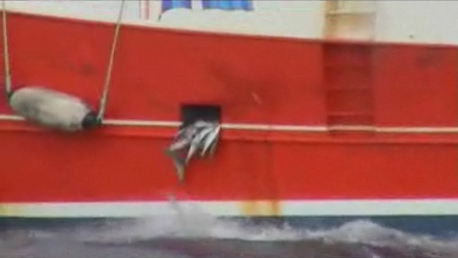Blaming foreigners for the vanishing fish
By Bagehot for The Economist
Jan 13th 2011, 15:03 THERE is a lot of talk in the air, just now, about the madness of the European Union’s Common Fisheries Policy (CFP), and how its strict quota system forces British trawlermen to throw vast quantities of fish back into the sea, dead. Hugh Fearnley-Whittingstall, a television chef and food writer, mounted a passionate attack on the CFP this week on Channel 4 (you can watch it here, as long as you can tolerate the maddening, compulsory advertisements about meerkats). As happens on such programmes, Mr F-W went out on a trawler with some gruff but friendly fishermen, who told him how it broke their hearts to throw perfectly edible cod back into the sea. The programme noted, correctly, that this is appallingly wasteful, and that the CFP is working very badly. It explained how the problem was that the giant, well-equipped boat in question had used up its cod quota for the year and was now fishing for other less desirable species like ling and monkfish in a desperate attempt to earn enough money to keep operating. But alas, when the nets were pulled back in they were full of lots of cod, and only a very few monkfish. Mr F-W looked miserable as he watched 90% of the catch being ditched over the side. … Having worked in Brussels for several years, reporting on the CFP and above all on the horrible annual ministerial meetings at which fish quotas are doled out to each of the 27 member countries, I can sympathise too. Even hardened diplomats described the annual December fish council as a sickening farce, in which scientists proposes fishing bans or tiny quotas to preserve fish species from extinction, the European Commission increases the quotas, national ministers increase them again, and national fishing fleets are sent out again to rape the seas. But here is the thing. It is emotionally satisfying to side with “our” British trawlermen, who risk their lives doing a dangerous yet somehow romantic job in wild seas, and dream of British fish being protected by British coastguard cutters ready to ram and biff foreign invaders. But alas, the true tragedy of EU fisheries policy is a lot more complicated. This is a blog posting rather than a polished article, so forgive me for offering a few thoughts for readers to chew on: Trawlermen are very good at telling reporters how it breaks their heart to throw fish over the side because of EU rules. Some are less quick to mention that throwing fish over the side for commercial profit is rife in their industry. It is called “high-grading” and happens when a trawler fills its holds with low or medium value fish near the beginning of a trip, then fills its nets with a more valuable species. Skippers routinely chuck the first catch over the side to make room for the more profitable fish. The trawlermen also say they are forced to continue fishing in waters full of cod, after their cod quotas are exhausted, just to make ends meet. It is wrong and awful, one skipper tells Mr F-W: he is forced to look for Dover Sole, but catches tonnes of cod instead, which he has to discard. I hate to be harsh, but just maybe what you are hearing there is somebody describing a business that is only marginally viable, and which is only viable if he does stupid and wasteful things like go out fishing in the knowledge he can only land a fraction of his catch. Trawling is only marginally viable in some northern European waters for all sorts of reasons. One big reason is historic over-fishing by fishing fleets. Another big reason is that there are still too many boats seeking to fish for too many days a year. Yes, the EU has paid national governments to decommission boats, but the boats that are left grow more and more powerful and efficient at finding fish every year. Even with a fleet of constant size, the so-called “technological creep” increases the average fleet’s killing capacity by about 4% a year. …
